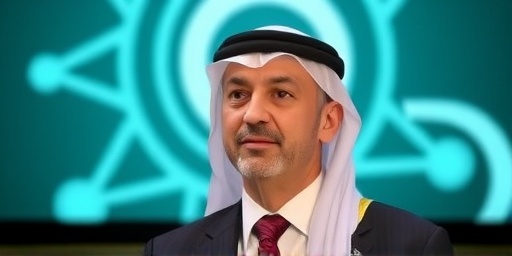In a landmark announcement that could reshape bilateral economic ties, the United Arab Emirates has pledged up to $50 billion in investments targeting Canada’s burgeoning energy and artificial intelligence sectors. The commitment comes hot on the heels of high-level discussions between UAE leaders and Canadian Prime Minister Mark Carney during his recent visit to Abu Dhabi. This UAE investment in Canada signals a strategic pivot towards collaborative innovation, blending the Gulf nation’s oil wealth with Canada’s expertise in sustainable energy and cutting-edge AI technologies.
Prime Minister Mark Carney, fresh from climate finance roles at global institutions, hailed the pledge as a “game-changer for sustainable development.” The talks, which spanned two days, focused on mutual interests in transitioning from fossil fuels to green energy while harnessing artificial intelligence to drive efficiency across industries. This move underscores Canada’s appeal as a stable investment destination amid global economic uncertainties.
UAE-Canada Summit Yields Groundbreaking Energy Partnership
The summit in Abu Dhabi marked a pivotal moment in UAE-Canada relations, evolving from traditional trade links into a multifaceted alliance. Prime Minister Mark Carney arrived amid swirling sands and diplomatic optimism, engaging in closed-door sessions with UAE’s Crown Prince Sheikh Mohammed bin Zayed Al Nahyan. Sources close to the negotiations revealed that discussions centered on leveraging Canada’s vast natural resources and the UAE’s financial prowess to accelerate the global energy transition.
Energy, a cornerstone of both economies, dominated the agenda. Canada, with its abundant oil sands, hydroelectric power, and leadership in carbon capture technologies, offers a complementary profile to the UAE’s vision of diversifying beyond petroleum. “We’re not just investing in pipelines; we’re building bridges to a net-zero future,” Carney stated in a post-summit press briefing. The pledge allocates a significant portion—estimated at $30 billion—of the total UAE investment to energy projects, including renewable initiatives like wind farms in Alberta and hydrogen production facilities in British Columbia.
Statistics highlight the potential scale: Canada’s energy sector currently contributes over 10% to its GDP, employing more than 500,000 people. With UAE backing, experts predict a 20% boost in clean energy output by 2030. This partnership aligns with the UAE’s Energy Strategy 2050, aiming for 50% clean energy by mid-century, and Canada’s Pan-Canadian Framework on Clean Growth and Climate Change.
Artificial Intelligence Takes Center Stage in Bilateral Deal
Beyond energy, artificial intelligence emerged as the wildcard in the UAE investment equation, with up to $20 billion earmarked for AI-driven ventures in Canada. Mark Carney emphasized AI’s role in optimizing energy systems, from predictive maintenance in oil rigs to smart grids that reduce waste. “Artificial intelligence isn’t a luxury; it’s the engine of tomorrow’s economy,” he remarked, drawing parallels to his tenure at the Bank of England where he championed tech integration in finance.
The UAE, home to the world’s first AI minister and hubs like Dubai’s AI Lab, sees Canada as an ideal partner due to institutions like the Vector Institute in Toronto and Mila in Montreal. Collaborative projects could include AI algorithms for seismic data analysis in energy exploration and machine learning models for climate modeling. A joint statement outlined plans for a UAE-Canada AI Innovation Fund, seeding startups at the intersection of energy and tech.
Market analysts are buzzing: PwC forecasts that AI could add $15.7 trillion to the global economy by 2030, with energy sectors poised to capture 15% of that value. In Canada, where AI investments have already surged 25% year-over-year, this influx from the UAE could catapult the country into the top five global AI players, fostering thousands of high-tech jobs in cities like Vancouver and Ottawa.
Economic Ripple Effects: Jobs, Growth, and Trade Boost for Canada
The $50 billion UAE investment in Canada is poised to ignite economic fireworks across the nation. Economists project it could create upwards of 100,000 direct and indirect jobs over the next decade, particularly in STEM fields related to energy and artificial intelligence. Mark Carney, whose visit was timed with Canada’s post-pandemic recovery, described it as “a vote of confidence in our resilient economy.”
Breaking it down, the energy segment alone might inject $10 billion into infrastructure upgrades, such as electrifying remote northern communities and expanding LNG export terminals on the Pacific Coast. This dovetails with Canada’s goal to become a net exporter of clean energy. Meanwhile, AI investments target R&D hubs, with potential for public-private partnerships involving giants like Shopify and Enbridge.
Trade data supports the optimism: Bilateral trade between the UAE and Canada reached $4.5 billion in 2023, up 15% from the previous year. This pledge could double that figure by enhancing supply chains—UAE capital funding Canadian tech exports back to the Middle East. Challenges remain, including regulatory hurdles and Indigenous consultations for energy projects, but early indicators suggest smooth sailing.
- Job Creation Projections: 50,000 in energy, 50,000 in AI-related roles
- GDP Impact: Potential 1-2% uplift to Canada’s annual growth
- Investment Timeline: Phased rollout over 5-10 years, starting with pilot projects in 2025
Global Geopolitics and Sustainability at the Forefront
On the international stage, this UAE investment underscores shifting alliances in a multipolar world. With tensions in the Middle East and energy security concerns in Europe, Canada positions itself as a reliable Western partner for Gulf states diversifying portfolios. Mark Carney’s diplomatic finesse, honed from UN climate envoy roles, played a crucial part in sealing the deal.
Sustainability threads through every aspect: The partnership commits to ESG (Environmental, Social, Governance) standards, with funds ring-fenced for low-carbon projects. For instance, a $5 billion joint venture aims at developing AI-enhanced carbon capture and storage (CCS) tech, vital as Canada stores over 20 gigatons of CO2 potential underground.
Critics, including environmental groups, urge caution against greenwashing, but proponents point to the UAE’s recent COP28 hosting as evidence of genuine intent. Quotes from UAE’s Minister of State for Artificial Intelligence, Omar Al Olama, reinforce this: “Canada’s innovation ecosystem will help us both lead in responsible AI for energy sustainability.”
Looking ahead, this collaboration could spawn follow-on agreements, including tech transfers and student exchanges. As negotiations evolve, watch for announcements on specific projects, potentially debuting at the 2025 G7 Summit. The ripple effects might extend to third countries, fostering a transatlantic energy-AI corridor that bolsters global resilience against climate and tech disruptions.
In essence, Prime Minister Mark Carney’s visit has not only unlocked unprecedented UAE investment in Canada but also set a blueprint for how resource-rich nations can pivot towards innovative, sustainable futures. Stakeholders from Ottawa to Dubai are already mapping out implementation roadmaps, promising a decade of transformative growth in energy and artificial intelligence.








